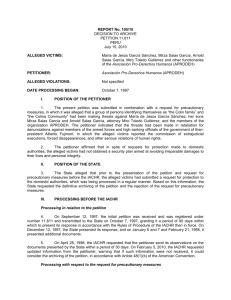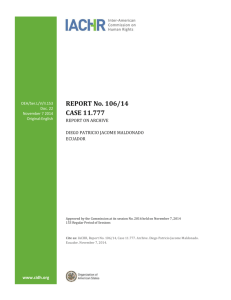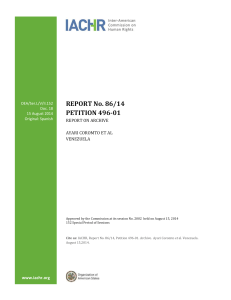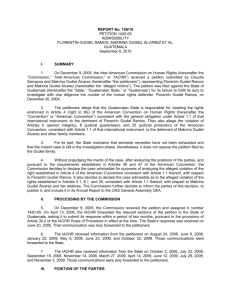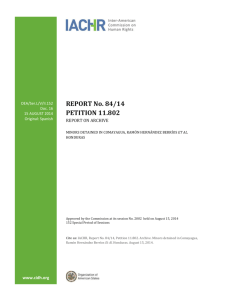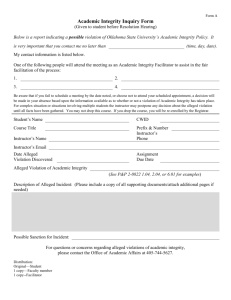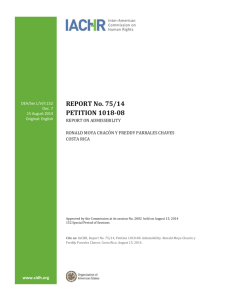Report No. 114/12 - Organization of American States
advertisement
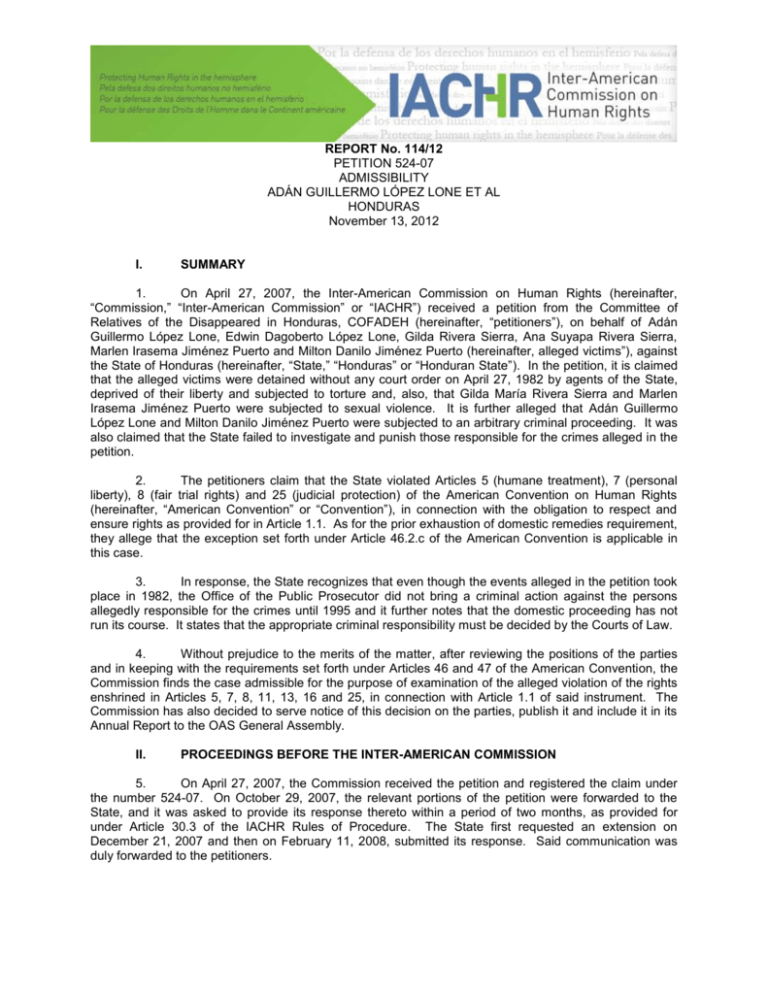
REPORT No. 114/12 PETITION 524-07 ADMISSIBILITY ADÁN GUILLERMO LÓPEZ LONE ET AL HONDURAS November 13, 2012 I. SUMMARY 1. On April 27, 2007, the Inter-American Commission on Human Rights (hereinafter, “Commission,” “Inter-American Commission” or “IACHR”) received a petition from the Committee of Relatives of the Disappeared in Honduras, COFADEH (hereinafter, “petitioners”), on behalf of Adán Guillermo López Lone, Edwin Dagoberto López Lone, Gilda Rivera Sierra, Ana Suyapa Rivera Sierra, Marlen Irasema Jiménez Puerto and Milton Danilo Jiménez Puerto (hereinafter, alleged victims”), against the State of Honduras (hereinafter, “State,” “Honduras” or “Honduran State”). In the petition, it is claimed that the alleged victims were detained without any court order on April 27, 1982 by agents of the State, deprived of their liberty and subjected to torture and, also, that Gilda María Rivera Sierra and Marlen Irasema Jiménez Puerto were subjected to sexual violence. It is further alleged that Adán Guillermo López Lone and Milton Danilo Jiménez Puerto were subjected to an arbitrary criminal proceeding. It was also claimed that the State failed to investigate and punish those responsible for the crimes alleged in the petition. 2. The petitioners claim that the State violated Articles 5 (humane treatment), 7 (personal liberty), 8 (fair trial rights) and 25 (judicial protection) of the American Convention on Human Rights (hereinafter, “American Convention” or “Convention”), in connection with the obligation to respect and ensure rights as provided for in Article 1.1. As for the prior exhaustion of domestic remedies requirement, they allege that the exception set forth under Article 46.2.c of the American Convention is applicable in this case. 3. In response, the State recognizes that even though the events alleged in the petition took place in 1982, the Office of the Public Prosecutor did not bring a criminal action against the persons allegedly responsible for the crimes until 1995 and it further notes that the domestic proceeding has not run its course. It states that the appropriate criminal responsibility must be decided by the Courts of Law. 4. Without prejudice to the merits of the matter, after reviewing the positions of the parties and in keeping with the requirements set forth under Articles 46 and 47 of the American Convention, the Commission finds the case admissible for the purpose of examination of the alleged violation of the rights enshrined in Articles 5, 7, 8, 11, 13, 16 and 25, in connection with Article 1.1 of said instrument. The Commission has also decided to serve notice of this decision on the parties, publish it and include it in its Annual Report to the OAS General Assembly. II. PROCEEDINGS BEFORE THE INTER-AMERICAN COMMISSION 5. On April 27, 2007, the Commission received the petition and registered the claim under the number 524-07. On October 29, 2007, the relevant portions of the petition were forwarded to the State, and it was asked to provide its response thereto within a period of two months, as provided for under Article 30.3 of the IACHR Rules of Procedure. The State first requested an extension on December 21, 2007 and then on February 11, 2008, submitted its response. Said communication was duly forwarded to the petitioners. 2 6. Additionally, the IACHR received information from the petitioners on the following dates: May 23, 2008, January 27, 2009, April 6, 2009, April 30, 2009, June 3, 2010, October 24, 2010, March 15, 2011, May 31, 2011 and October 4, 2011. Said communications were duly forwarded to the State. Information was also received from the State on the following dates: September 8, 2008, September 14, 2010 and July 1, 2011. Said communications were duly forwarded to the petitioners. Friendly Settlement Process 7. In its initial response of February 11, 2008, the State noted that “it is in the process of examining the possibility of settling the instant matter through the friendly settlement process,” and in its submission of September 8, 2008, it stated that “it reiterates to the Honorable Inter-American Commission on Human Rights its absolute willingness to attempt to settle the instant petition through the friendly settlement process.” While, in their note of May 23, 2008, the petitioners stated that they were “open to accepting the State’s offer,” they also stated “the friendly settlement must include international human rights terms and criteria.” Accordingly, on February 23, 2009, the IACHR placed itself at the disposal of the parties with a view to reaching a friendly settlement. On April 6, 2009, a proposal on the terms of the friendly settlement was submitted. On June 3, 2010, the petitioners decided not to continue with the friendly settlement process and, on February 15, 2011, the IACHR confirmed that said process had been unsuccessful. III. POSITIONS OF THE PARTIES A. The Petitioners 8. The petitioners provide an account of the situation in Honduras during the 1980s, noting specifically that despite a civilian government being in power at the time, control was actually exerted by the armed forces, which committed “abuses of authority, carried out illegal detentions, and disappearances of political opponents.” They claim that student, trade union and grass roots organizations were under surveillance, infiltrated and their main leaders were murdered or abducted by military units. 9. The petitioners further claim that during the 1980s, Adán Guillermo López Lone, Edwin Dagoberto López Lone, Gilda María Rivera Sierra, Marlen Irasema Jiménez Puerto and Milton Danilo Jiménez Puerto were students at the National Autonomous University of Honduras and members of the University Revolutionary Force know by its Spanish acronym as FUR, a legally registered organization at the University, which according to the petitioners, acted strictly within this scope, engaged in activities, which were public, and ideologically was openly opposed to the form of government of the time. They also contend that Suyapa Rivera Sierra did not belong to any student or political organization. 10. The petitioners assert that on April 27, 1982, at around 5:30 AM, a group of six heavily armed men broke into the house where the alleged victims were living, in the Miraflores neighborhood of the City of Tegucigalpa. They claim that Rafael Rivera Torres (Gilda María’s and Ana Rivera Sierra’s father), who was renting the house shared by these young people, asked the armed men for arrest warrants yet he received no response to his request and was detained as well. They recount that Rafael Rivera Torres and the alleged victims were transferred in several double-cab pick-up truck-type vehicles without license plates and with tinted windows to the police station located in the El Manchén Neighborhood. They claim that it all took place in plain sight of local residents. 11. At the Barrio el Manchén police station, the alleged victims were put into cells and held in solitary confinement and Rafael Rivera Torres was taken back to his house and was forced to allow a search thereof. The petitioners assert that the search took place in the presence of Enrique Flores Valeriano, Vice Rector of the National University, Norma Lanza de Flores 1 and Carlos Rivas Garcia, a 1 Based on the information provided by the petitioners, Enrique Flores Valeriano and Norma Lanza de Flores lived nearby the house where the alleged victims lived. 3 Deputy of the National Congress. They contend that when the search was over, Rivera Torres went to the police station to inquire about the six young people. 12. The petitioners claim that the alleged victims were interrogated at the police station in holding cells on general matters of their personal lives and political issues. They note that they were held at this site blindfolded, gagged and with their hands in restraints until night time, when they were transferred to a house located 45 minutes from Tegucigalpa. They note that the claims of the alleged victims concur in that the most serious physical, verbal and psychological violence occurred during their stay at the aforementioned house. 13. The petitioners provide details of the treatment received by the alleged victims. In short, they contend that the victims were beaten and threatened with death and that Gilda Maria Rivera and Marlen Irasema Jiménez Puerto were threatened with rape. They claim that they were interrogated separately, on matters of university politics, principal student leaders and the organization they belonged to. They state that men and women were held in different rooms. They further claim that they were deprived of food and that some of them had to relieve themselves in their clothes, because they were not taken to the bathroom very often and, when they were taken, it was always with a person guarding them. Guillermo Lopez Lone was allegedly locked in a closet, gagged with his hands and feet restrained. It was also alleged that a piece of rubber was place over his head and face, while he was being beaten. They assert that Edwin Lopez Lone, Guillermo’s brother, was told that his brother was dead and buried. They claim that Edwin was interrogated and brutally beaten and that a piece of rubber had been used to suffocate him. They further contend that Milton Jimenez Puerto had been kicked in different parts of his body, threatened that his parents would be killed and he was told that Guillermo was already dead and buried. They also state that Ana Suyapa Rivera Sierra was held under a stairway, blindfolded and with her hands in restraints. They note that she was able to recognize one of the persons who took part in the detention. 14. They allege that both Gilda María Rivera Sierra and Marlen Irasema Jiménez Puerto endured acts of physical, verbal and psychological violence and assaults of a sexual nature. They claim that Gilda was beaten on the back, and was told she was going to be killed, that she was going to be raped and that no one would ever find her body. They further contend that she was taken to a bathroom and stripped naked, while they were saying that they were going to rape her, which caused her to panic. They note that she was put under the shower from where she managed to get a glimpse of a bloodied man, apparently wearing bedtime clothing. She asserts that she tried to communicate with him, but he moved away and, out of fear of her captors, did not attempt to do so again. Marlen Irasema was told that one of the boys was dead and that before he died he had told the truth about her. They contend that she was threatened with being tortured “like they tortured the female members of the guerrilla forces in El Salvador, giving them electric shocks in the vagina and in the breasts, opening up their legs and putting a mouse in.” They also claim that she was forced into a closet. They note that an individual that was called “peasant” [‘campesino’] touched her body and attempted to kiss her. They assert that the alleged victim resisted, to which ‘peasant’ responded by saying that “he was doing her a favor since she was going to be killed.” 15. The petitioners state that three habeus corpus2 appeals were lodged, requesting that the whereabouts of the six young people be investigated. They indicate that the three appeals were denied because the presiding judges found no records of the arrests of the alleged victims. They state that the Supreme Court ordered the investigation and the appeals to judicial file 445-82 of the Supreme Court of Justice to be closed. 16. The petitioners claim that on Friday April 30, 1982, the alleged victims were transferred again to the police station of the neighborhood of El Manchén in Tegucigalpa. Their contention is that their blindfolds were removed and the restraints were untied from their hands and they were 2 A) Motion to Show Person of April 28, filed with the Supreme Court of Justice by Anarela Velez (File 445-82). B) Motion to Show Person of April 28, filed by Ismael Zepeda with the Supreme Court for the Judge to personally inspect the jails. C) Motion to Show Person of April 30, filed by Rivera Torres with the Supreme Court of Justice. 4 photographed and booked. They also claim that they still were not fed nor were they given an explanation for their detention or provided assurances for their safety. 17. It was noted that on May 4, 1982, Marlen Irasema Jiménez Puerto, Edwin Dagoberto López Lone, Gilda Rivera Sierra and Ana Suyapa Rivera Sierra were released without any explanation. They allege that Guillermo López Lone and Milton Jiménez Puerto remained under detention and that on May 7 of the same year, men dressed in plain clothes and others in military garb made them sign papers, which they were not allowed to read, they were fingerprinted and photographed. They assert that they were brought before the First Trial Court for Criminal Matters of the Department of Francisco Morazán for “Crimes against State Security and Possession of National Government-Owned Weapons.” They also claim that the prison transfer sheet states that they were arrested on April 27 at 5:30 for “resistance and evidence that explosive materials were located at the aforementioned house.” They assert that these statements are false. 18. As to the criminal proceeding brought against Milton Jiménez Puerto and Guillermo López Lone, they claim that on May 7, 1982, their statements were taken by the First Trial Court for Criminal Matters of the Department of Francisco Morazán. They assert that on that day their detention and transfer to the Central Penitentiary was ordered. They claim that on May 13 of the same year the judge issued an order of imprisonment for Totalitarian and Dissociative Activity against the Republican, Democratic and Representative Form of Government to the detriment of the State of Honduras. They contend that they were examined that day by Doctor Luis Vidal Ramos, a forensic medical expert, who stated, “scars and excoriations on the wrists, [which are] injuries that are characteristic of those produced with a blunt weapon (cord) were found on both of them.” They claim that the doctor did not examine for other injuries, “such as the insensitivity and generalized head ache [cephalea] about which they complained” and that no psychological examination was ordered either to make it possible to determine the damage caused by the alleged torture. 19. They allege that on May 14, 1982, the attorney of the alleged victims posted a bond to be released. On that day, the Judge granted the motion and ordered the release on bail of Jiménez Puerto and López Lone. They further note that on November 25, 1983, the First Trial Court for Criminal Matters dismissed the case with prejudice on the grounds of a lack of evidence to justify the order of imprisonment. They indicate that on December 15, 1983, the Appellate Court upheld the trial court judgment. 20. Regarding domestic court proceedings, they state that the habeas corpus appeals filed on behalf of the alleged victims at the time of their detention were unsuccessful. They note that on July 21, 1995, the Office of the Prosecutor for Human Rights brought charges against nine officials for alleged responsibility in the crimes of attempted murder and illegal detention, against the alleged victims. They assert that the Office of the Prosecutor filed a motion to seal the case records during the investigative stage. After several parts of the investigation were conducted, they indicate that on December 4, 1995 imprisonment orders were issued against state agents Juan Blas Salazar, Alexander Raymundo Hernández Santos and Billy Fernando Joya Amendola, for the crimes of illegal detention and attempted murder and against Manuel de Jesús Trejo Rosa for the crime of attempted murder, against the alleged victims. They claim that a statement was taken only from Jesús Trejo Rosa and that despite arrest warrants being in effect, no efforts were made to ascertain the whereabouts of the other defendants. They contend that the investigations were marred by delays and inadequate efforts were made to move the proceedings forward or find those who were culpable for the crimes. They also claim that on May 19, 2002, Juan Blas Salazar was convicted for the crime of illegal detention and cruel treatment against Milton Danilo Jiménez Puerto and Adán Guillermo López Lone. Blas Salazar was sentenced to a prison term of four years. As for the other men who were charged, the petitioners report that they are free. 21. Regarding prior exhaustion of domestic remedies, they argue that the exception set forth under Article 46.2.c of the American Convention applies because there has been unwarranted delay in adjudicating the cases in domestic courts, being that when the petition was lodged with the IACHR, 12 years had elapsed since the beginning of the criminal investigation and punishment of those responsible. They further claim that the domestic investigation has been inactive since July 2006. 5 B. The State 22. Regarding the context of violence as alleged by the petitioners, the State claims “it has widely announced to the appropriate national and international bodies, the responsibility of some government authorities after the so-called Doctrine of National Security was put into practice during the 1980s.” The State also contends that it has made efforts toward providing reparation for the damages caused to the victims and their next of kin and to ensure citizens that these crimes will not be repeated. Accordingly, it reiterates its commitment to ensure full enjoyment of justice, liberty, culture and economic and social wellbeing for all inhabitants. 23. As for the events alleged in the petition, which took place in 1982, it indicates “the State cannot fail to acknowledge that it did not file criminal suit to determine responsibility of those culpable of the crimes until 1995.” It adds that the Office of the Public Prosecutor brought charges in 1995 against Alexander Raimundo [Hernández] Santos; Juan Blas Salazar Meza, Manuel de Jesús Trejo, Juan Evangelista López Grigalva, Billy Fernando Joya Amendola, Julio Cesar Funez Álvarez, José Amílcar Zelaya Rodríguez, Juan Ramón Peña Paz, Roberto Erazo Paz and Jorge Antonio Padilla, all of whom were indicted as perpetrators of the crimes of attempted murder and illegal detention against the alleged victims. 24. It notes that the criminal proceeding was identified with the number 240-02 and was instituted on July 21, 1995, before then Trial Court for Criminal Matters of the Department of San Francisco Morazán. It further asserts that on October 17, 1995, the Court ordered the arrest of 4 of the defendants and, subsequently, of the remaining ones, according to details set forth in documents attached to the case file before the IACHR. It asserts that as a result of the proceedings, the Court issued orders of imprisonment for Alexander Raimundo [Hernández] Santos; Juan Blas Salazar Meza, Manuel de Jesús Trejo, Billy Fernando Joya Amendola and José Amílcar Zelaya Rodríguez. It notes that in accordance with the criminal procedure in force at the time, the order of imprisonment was warranted as the judge found evidence of the commission of the crime and rational indicia of the involvement of the defendants. It claims that even though the 1985 Code of Criminal Procedure limits the length of the preliminary investigation stage of the proceedings to a maximum of one month, in practice, delays and lack of celerity were common occurrences of the written and inquisitorial proceedings, which prevailed at the time. It contends that the reasons for delays ranged from a build-up of cases in courts to the lack of court personnel and resources. It notes that, consequently, the State promoted the reform of the criminal justice system in Honduras, which has been in effect since 2002. It also states that in this particular case, in addition to the factors mentioned above and the complexity of the trial, it believes that the persistent filing of appeals and amparos for relief from the Supreme Court, both by the prosecution and by the defense of the alleged victims had an effect on the duration of the proceeding. 25. It claims that as a result of case 240-02, one of the defendants, Juan Blas Salazar Meza, the former Director of the now defunct National Directorate of Investigation, was convicted for the crimes of illegal detention and attempted murder of two of the six alleged victims. Nonetheless, it asserts that the sentence has not been served. It notes that the proceedings were not completed and that “the Courts of Justice shall be called to determine criminal responsibility of the other defendants.” It recognizes that the time that elapsed to dispose of the case has been considerable, but it notes that the IACHR must take into account its arguments in order to determine whether the petition is admissible. 26. The State expressed its interest in reaching a friendly settlement agreement. On July 1, 2011, it reported on efforts being made in the domestic arena in this regard from 2008 to 2010. IV. ANALYSIS A. Competence of the Inter-American Commission ratione personae, ratione loci, ratione temporis and ratione materiae 6 27. The petitioners are entitled, in principle, under Article 44 of the Convention, to lodge petitions before the IACHR. The petition identifies as alleged victims six individuals, for whom the Honduran State committed to respect and ensure the rights enshrined in the American Convention and international instruments. Therefore, the Commission is competent ratione personae to examine the instant petition. 28. The IACHR is competent ratione loci to entertain the petition, inasmuch as violations of rights protected in the American Convention are alleged therein to have taken place within the territory of a State Party to said convention. 29. The IACHR is competent ratione temporis, being that the facts alleged in the petition presumably occurred when the obligation to respect and ensure the rights protected in the Convention was already in effect for Honduras, State that deposited the ratification instrument on September 8, 1977. Lastly, the IACHR is competent ratione materiae, because the petition charges potential violations of human rights protected by the American Convention. B. Other Admissibility Requirements 1. Exhaustion of Domestic Remedies 30. Article 46.1.a) of the American Convention provides that for a petition filed with the Commission to be admissible in keeping with Article 44 of the Convention, it is necessary for domestic remedies to be pursued and exhausted in accordance with generally recognized principles of international law. The purpose of this requirement is to make it possible for national authorities to hear cases on alleged violations of a protected right and, when appropriate, have the opportunity to resolve them before they are heard by an international body. Article 46.2 of the Convention stipulates that the requirement for prior exhaustion of domestic remedies does not apply when: (a) the domestic legislation of the state concerned does not afford due process of law for the protection of the right or rights that have allegedly been violated; (b) the party alleging violation of his rights has been denied access to the remedies under domestic law or has been prevented from exhausting them; or, (c) there has been unwarranted delay in rendering a final judgment under the aforementioned remedies. These instances do not only refer to the formal existence of such remedies, but also to such remedies being adequate and effective. 31. In the instant case, the petitioners maintain that the exception provided for in Article 46.2.c of the American Convention applies, because there has been unwarranted delay by the Honduran authorities. In response, the State has recognized that while the facts alleged in the petition took place in 1982, the Office of the Public Prosecutor did not bring criminal charges against the individuals who were allegedly responsible for them until 1995. It also contended that the delay in the decisions of the domestic bodies was a result of typical traits of the Honduran administration of justice system as well as the persistent filings of appeals by the prosecution and the defense. 32. Without getting into an examination of the arguments put forth by the parties regarding the alleged violation of the rights to a fair trial and judicial protection, the Commission notes that the following individuals Adán Guillermo López Lone, Edwin Dagoberto López Lone, Gilda Rivera Sierra, Ana Suyapa Rivera Sierra, Marlen Irasema Jiménez Puerto and Milton Danilo Jiménez Puerto were detained without any arrest warrant on April 27, 1982, allegedly by agents of the State, were deprived of their liberty, transferred to illegal detention centers and allegedly subjected to cruel and inhuman treatment and torture, with four of them being released a few days later and two of them undergoing a trial that culminated in 1983 with a dismissal with prejudice. It further notes that with regard to these crimes, eight years later in 1995, the Office of Public Prosecutor of Honduras indicted several public officials for their alleged involvement in the crimes alleged in the petition. 33. The IACHR also notes that, despite arrest warrants having been issued for the officials who were allegedly involved, according to information provided by the parties, only Juan Blas Salazar Meza, the former Director of the now defunct National Directorate of Investigation, has been tried and convicted for the crimes of illegal detention and attempted murder of two of the six alleged victims and 7 that his sentence has not been served. With regard to the other individuals charged by the Office of the Public Prosecutor, the proceedings have still not concluded. 34. The Commission notes that the State has not provided concrete information on the outcome of the proceedings or on the measures ordered to move beyond the preliminary investigation stage. The State has not provided either any information on any steps forward it may have taken to clarify the crimes and punish those responsible. The Inter-American Commission, therefore, establishes, for the purpose of admissibility, that an unwarranted delay by the Honduran judicial bodies with regard to the alleged facts has been verified. Consequently, the IACHR applies the exception to the rule of prior exhaustion of domestic remedies set forth in Article 46.2.c of the American Convention to this matter. 35. Lastly It must also be noted that application of the exceptions to the rule of prior exhaustion of domestic remedies set forth in Article 46.2 of the Convention is closely linked to the determination of possible violations of certain rights enshrined therein, such as the guarantees of access to justice. Nonetheless, due to its nature and purpose, Article 46.2 is a norm of autonomous content, as opposed to the substantive norms of the Convention. Therefore, the determination as to whether or not the exceptions to the rule of prior exhaustion of domestic remedies set forth in said provision are applicable to the case in question, must be made prior to and separately from examination of the merits of the matter, inasmuch as the merits examination is governed by a different standard of evaluation from the one used to determine violation of Article 8 and 25 of the Convention. It should be clarified that the causes and effects preventing exhaustion of domestic remedies in the instant case shall be examined, as pertinent, in the report on the merits of the controversy adopted by the Commission, in order to establish whether they actually constitute violations of the Convention. 2. Timeliness of the Petition 36. Pursuant to Article 46.1.b of the Convention, in order for a petition to be admitted, it must be lodged within a period of six months from the date on which the victim was notified of the final judgment exhausting domestic remedies. The provision of the six months ensures legal certainty and stability, once a decision has been issued. Nonetheless, under Article 32.2 of the IACHR Rules of Procedure, in those cases in which the exceptions to the requirement of prior exhaustion of domestic remedies are applicable, the petition shall be lodged within a reasonable period of time, as determined by the Commission. For this purpose, the Commission shall consider the date on which the alleged violation of rights occurred and the circumstances of each case. 37. In the petition under consideration, the IACHR has found application of the exception to the rule of prior exhaustion of domestic remedies set forth in Article 46.2.c of the American Convention to be in order. Taking into account that the facts alleged in the petition took place in April 1982, that the Office of the Public Prosecutor brought criminal charges against those allegedly responsible in 1995, that the criminal proceeding is still pending in domestic courts as is execution of sentence of the only person convicted, the IACHR finds that the petition was lodged within a reasonable period of time and, as such, considers the requirement set forth in Article 46.1 of the Convention to have been met. 3. Duplication of International Proceedings and res judicata 38. The case file contains no evidence that the subject matter of this petition is pending in another proceeding before an international adjudicatory body, or that the petition is substantially the same as any petition previously examined by the IACHR or any other international body. Therefore, the requirements set forth in Articles 46.1(c) and 47 (d) of the Convention have been met. 4. Colorable Claim 39. The Commission finds that it is not appropriate, during this stage of the proceedings, to decide whether or not the alleged violations to the detriment of the alleged victims occurred. For purposes of admissibility, the IACHR must rule at this point in time only as to whether the facts laid out in the petition, if proven, would tend to establish violations of the American Convention, as stipulated in 8 Article 47.b thereof, and whether the petition is “manifestly groundless” or it is “obviously out of order,” as provided in subparagraph (c) of the same article. 40. The standard for evaluating these factual requirements is different from the requirement for deciding on the merits of a petition. The IACHR must conduct a prima facie evaluation to determine whether the petition establishes grounds for the apparent or potential violation of a right guaranteed by the Convention, but not to establish the existence of a violation.3 At this stage, it should perform a summary analysis that does not involve any prejudgment or advance opinion on the merits. The IACHR Rules of Procedure themselves, by establishing an admissibility phase and a merits phase, reflects this distinction between the evaluation that the Inter-American Commission must carry out to declare a petition admissible and that required to establish whether a violation attributable to the State has been committed.4 41. Furthermore, neither the American Convention nor the IACHR Rules of Procedure require the petitioner to identify the specific rights that are allegedly violated by the State in the matter submitted to the Commission, even though the petitioners may do so. It is the job of the Commission, based on the legal precedents of the system, to determine in its admissibility reports, what provision of the relevant Inter-American instruments is applicable and could tend to establish a violation thereof if the alleged facts are proven by means of sufficient evidence. 42. In the instant case, the petitioners contend that the alleged victims, five of whom were members of a university organization, had been illegally detained, abducted and tortured in a context of political repression, based on the Doctrine of National Security, targeted towards individuals who were perceived as opposed to the ruling regime. They also claim that the alleged victims did not have access to due process of the law. 43. Based on the facts laid out in the petition, the Commission finds that, should they be proven true, they could constitute violations of the rights set forth in Articles 5, 7, 8, 13, 16 and 25 of the American Convention, respectively, in connection with Article 1.1 of the same international instrument. With regard to the charges of sexual violence allegedly perpetrated by agents of the State against Gilda María Rivera Sierra and Marlen Irasema Jiménez Puerto, the Commission has decided to include, in addition to the above-cited articles, Article 11 of the American Convention, in connection with Article 1.1 of said legal instrument. The IACHR shall examine the alleged failure to investigate the alleged violations, in light of the provisions of the Inter-American Convention to Prevent and Punish Torture and the Inter-American Convention on the Prevention, Punishment and Eradication of Violence against Women, in connection with Article 2 of the American Convention. 44. As to whether the claim is groundless or out-of-order, the IACHR finds that the petitioners have provided prima facie evidence to meet the requirements set forth in Article 47.b of the American Convention. V. CONCLUSIONS 45. The Commission finds that it is competent to examine the claims brought forth by the petitioners regarding the alleged violation of Articles 5, 7, 8, 11, 13, 16 and 25 in connection with Article 1.1 of the American Convention, and that the claims are admissible, under the requirements provided for in Articles 46 and 47 of the American Convention. 3 See IACHR, Report No. 128/01, Case 12.367, Mauricio Herrera Ulloa and Fernán Vargas Rohrmoser of the Daily Newspaper “La Nación” (Costa Rica), December 3, 2001, para. 50; Report No. 4/04, Petition 12.324, Rubén Luis Godoy (Argentina), February 24, 2004, para. 43; Report No. 32/07, Petition 429-05, Juan Patricio Marileo Saravia et al (Chile), April 23, 2007, para. 54.. 4 See IACHR, Report No. 31/03, Case 12.195, Mario Alberto Jara Oñate et al (Chile), March 7, 2003, para. 41; Report No. 4/04, Petition 12.324, Rubén Luis Godoy (Argentina), February 24, 2004, para. 43; Petition 429-05, Juan Patricio Marileo Saravia et al (Chile), April 23, 2007, para. 54; Petition 581-05, Víctor Manuel Ancalaf LLaupe (Chile), May 2, 2007, para. 46. 9 46. the matter, Based on the foregoing arguments of fact and law and without prejudice to the merits of THE INTER-AMERICAN COMMISSION ON HUMAN RIGHTS, DECIDES: 1. To find the instant claim admissible with regard to Articles 5, 7, 8, 11, 13, 16 and 25 in conjunction with Article 1.1 of the American Convention. 2. To notify the Honduran State and the petitioners of this decision. 3. To proceed to examine the merits of the matter. 4. To publish this decision and include it in its Annual Report to the OAS General Assembly. Done and signed in the city of Washington, D.C., on the 13th day of the month of November, 2012. (Signed): José de Jesús Orozco Henríquez, President; Tracy Robinson, First Vice-President; Felipe González, Second Vice-President; Rosa María Ortiz and Rose-Marie Antoine, Commissioners.
